Dean's Letter
2022 marked a year of transition for the college — one that emerged from pandemic restrictions and returned to relative normalcy in its later months. Part of this return to normalcy involved the gradual conclusion of our COVID-19-era programs, including the Cornell COVID-19 Testing Laboratory, which concluded its surveillance shortly after the end of 2022. However, the college moves forward with the expertise and capacity to respond to future potential outbreaks.
As COVID-19 efforts wound down, every other effort at the college has increased capacity and impact; as this annual report illustrates, our education, research, clinical and diagnostic efforts have made robust expansion. Areas of particular growth include our remarkable expansion of D.V.M. program scholarships and the increase in new gifts and commitments to the college during 2022. Additionally, this year saw the advent of several new and exciting initiatives, including the Duffield Institute for Animal Behavior, the Cornell Veterinary Educators' Academy and the inaugural cohort of the Dean's Leaders Program. The Cornell Richard P. Riney Canine Health Center grew dramatically in its programmatic, research and outreach efforts during this year as well.
I hope you will join me in reviewing the progress of our college's efforts and impact from 2022.
Sincerely,
Lorin D. Warnick, D.V.M., Ph.D.'94
Austin O. Hooey Dean of Veterinary Medicine
Education
Faculty in the CVM support four educational programs: D.V.M., Ph.D., M.P.H., and M.P.S. In 2022, substantial progress was made across many of the curricula to support student learning outcomes and professional success, including curriculum renewal, piloting competency based assessment, adding more professional skills training to strengthen the career readiness of graduates, expanding diversity, equity and inclusion training, and veterinary business and management training.
The college also implemented several new programs to increase support for students, including a Learning Community Program designed to help first-year veterinary students acclimate to the curriculum and veterinary profession, and group counseling session to support overall wellbeing and stress management. In addition, multiple faculty underwent training in medical education coaching.
Total Students - All Degree Programs Chart
| Total students, all degree programs table | |||||
|---|---|---|---|---|---|
| Year | FY 2018 | FY 2019 | FY 2020 | FY 2021 | FY 2022 |
| D.V.M. | 433 | 443 | 460 | 478 | 480 |
| Ph.D. | 75 | 81 | 88 | 95 | 101 |
| M.P.H. | 35 | 54 | 76 | 88 | 94 |
M.P.S. | 14 | 13 | 10 | 8 | 14 |
| Total | 557 | 591 | 634 | 669 | 689 |
•A majority of students are women in all programs: D.V.M. 84%; M.P.H. 77%; Ph.D. 68%; M.P.S. 80%.
•URM and priority populations continue to represent a growing portion of students: D.V.M. 17%; M.P.H. 80%; Ph.D. 26%; M.P.S. 19%.
•Slightly over 50% of D.V.M. graduates enter private practice with others pursuing internships and residencies. 70% have a companion animal interest.
D.V.M. Program Scholarships ($M, all classes) Chart
| D.V.M. program scholarships table | |||||
|---|---|---|---|---|---|
| Year | FY 2018 | FY 2019 | FY 2020 | FY 2021 | FY 2022 |
| Total scholarship funds $M | $2.7 | $2.6 | $2.6 | $3.0 | $3.7 |
•CVM private practice salaries of $117k continue to exceed national averages by +2.7%.
•CVM student debt of $151k is 7% below the national average of other D.V.M. graduates.
•Through consistent efforts, graduate debt to private practice starting salary ratio has declined from 1.8 to 1.1 in 5 years.
Research
The college continues to see high levels of research productivity in key areas including infectious disease; genomics; cancer biology; reproductive biology; stem cell biology and regenerative medicine; dairy production, food systems, and sustainable food production; and applied clinical research. Many of research efforts involve interdisciplinary projects done in collaboration with other Cornell colleges and other academic institutions.
Sponsored research direct cost expenses ($M) FY 2018 to FY 2022 Chart
| Sponsored research direct cost expenses data table | |||||
|---|---|---|---|---|---|
| Year | FY 2018 | FY 2019 | FY 2020 | FY 2021 | FY 2022 |
| Federal | 13.8 | 16.1 | 17.4 | 19.4 | 21.7 |
| Private | 5.8 | 5.8 | 6.5 | 6.5 | 8.1 |
| State | 9.4 | 9.3 | 8.3 | 8.2 | 9.1 |
- CVM holds the most NIH R01 grants among all U.S. veterinary colleges.
- CVM ranks third in total NIH funding among other veterinary colleges.
- Sponsored research direct costs have increase annually since 2015 and totaled roughly $39M in the last fiscal year.
Clinical and Diagnostic Services
Our hospitals and diagnostic lab continue to serve the community, state and country through 24-7 clinical 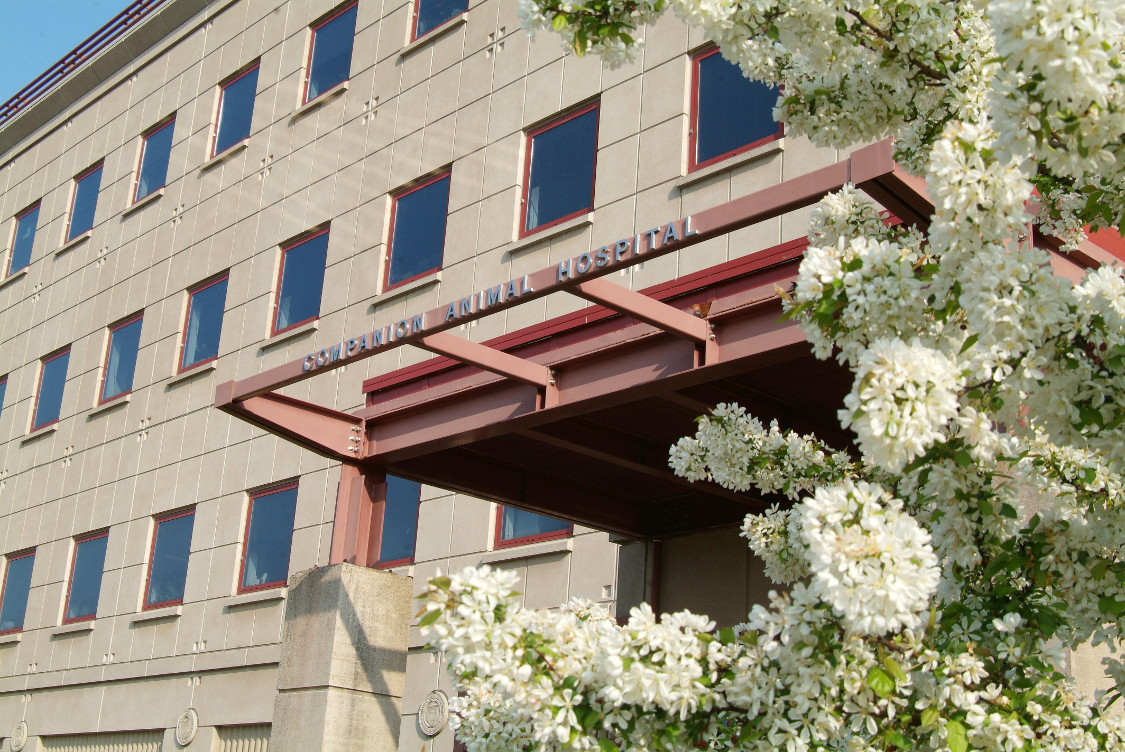 and diagnostic services.
and diagnostic services.
Hospitals
With record caseloads since the pandemic, the Cornell University Hospital for Animals continues to deliver board-certified and emergency care to all species.
Cornell University Hospital for Animals Caseload (K) FY2018 - FY 2022 Chart
| Hospital caseload data table | |||||
|---|---|---|---|---|---|
| Year | FY 2018 | FY 2019 | FY 2020 | FY 2021 | FY 2022 |
| Caseload (K) | 26.43 | 27.3 | 24.4 | 30.7 | 34.5 |
| Ambulatory caseload data table | |||||
|---|---|---|---|---|---|
| Year | FY 2018 | FY 2019 | FY 2020 | FY 2021 | FY 2022 |
| Caseload | 54,029 | 40,878 | 33,469 | 28,010 | 28,876 |
| Visits | 3,050 | 2,427 | 2,785 | 2,400 | 2,339 |
Animal Health Diagnostic Center
The Animal Health Diagnostic Center has continued to expand its testing services across the state and the country, seeing a significant increases in accessions after the pandemic, and continuing its veterinary support services that assist state veterinarians with diagnostic questions.
Accessions (K) FY18 to FY22
| AHDC accessions data table | |||||
|---|---|---|---|---|---|
| Year | FY 2018 | FY 2019 | FY 2020 | FY 2021 | FY 2022 |
| Accessions (K) | 222.3 | 227.0 | 223.9 | 258.7 | 282.7 |
New Initiatives
The Duffield Institute for Animal Behavior
Thanks to a new $12.1 million grant from the Dave & Cheryl Duffield Foundation in 2022, the College of Veterinary Medicine launched a new institute focused on companion animal behavior that will serve as a one-of-a-kind resource for veterinarians and pet owners nationwide. The new Duffield Institute for Animal Behavior will build on the college’s globally recognized academic, research, clinical and outreach programs to advance understanding of animal behavior and well-being – with the ultimate goal of improving the lives of companion animals and their caretakers.
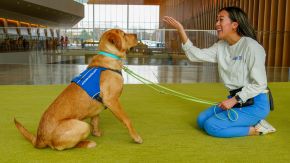
Cornell Richard P. Riney Canine Health Center
Through the visionary support from the Riney Family Foundation in 2021, the Cornell Richard P. Riney Canine Health Center will dramatically accelerate the college’s efforts to help canine health research become more relatable, researchers more accessible, and canine health information and programming more responsive to the needs of dogs and those who care for them.
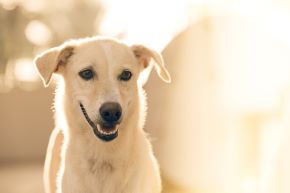
Cornell Veterinary Educators Academy
Founded in 2022, the academy helps veterinary faculty, practitioners and trainees hone their teaching skills in traditional classroom and clinical environments through bi-annual conferences, a Fellows program, and topical seminars.
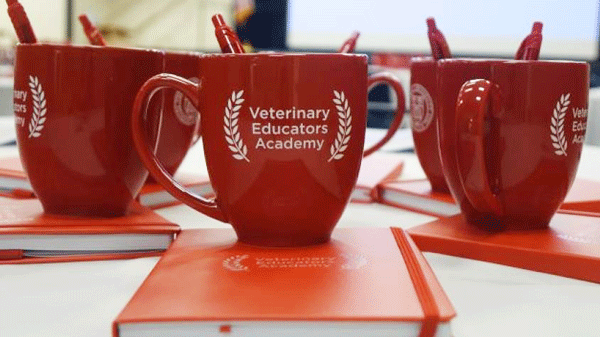
Dean's Leaders Program
With its inaugural cohort starting in 2022, this program is designed to advance the college's and the veterinary profession’s commitment to access, equity, representation and inclusion. It is also designed to enhance the diversity of Cornell’s D.V.M. student population, enriching and enhancing academic readiness and professional success
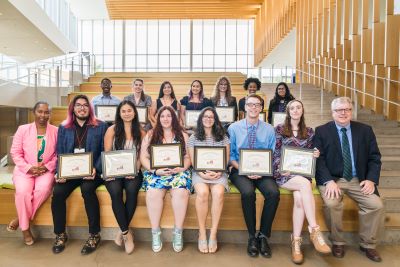
Faculty & Staff
2022 has been a year of great faculty recruitment and renewal, as many members have retired and major efforts have been made to fill vacated positions. Additionally, this year has been a time of staff growth, driven by the expansion of the M.P.H. program, an increase in demand for clinical services and the launch of new programs.
- CMV faculty have grown by 3% over the past 4 years to a total of 216
- Number of tenure/tenure-track faculty: 106
- CVM staff have grown by 25 over the past 4 years to a total of 651
- CVM interns and residents grew by 20% percent over the past 4 years to a total of 151.
Alumni Affairs and Development
Philanthropic support to the College of Veterinary Medicine in FY22 from over 4,600 donors led to a record-setting year, during which gifts to establish the Richard P. Riney Canine Health Center and the Duffield Institute for Animal Behavior propelled giving to nearly $68M. This support enabled the recruitment of multiple new tenure tracked faculty, grew overall scholarship funds, and provided investment in numerous research, teaching and service initiatives. Throughout the Cornell University to do the greatest good Campaign, between FY19 and FY22, the college has raised over $121M.
New Gifts and Commitments $M FY18 to FY22 Chart
| New gifts and commitments data table | |||||
|---|---|---|---|---|---|
| Year | FY 2018 | FY 2019 | FY 2020 | FY 2021 | FY 2022 |
| $M | 13.2 | 20.3 | 15.4 | 17.3 | 67.7 |
Unrestricted Funds $M FY18 to FY22 Chart
Over $120 M in unrestricted funds was donated to impact a variety of areas including support for the next generation of veterinarians and researchers, assistance with recruitment of top faculty, and delivery of exemplary patient care in our animal hospitals.
| Unrestricted funds data table | |||||
|---|---|---|---|---|---|
| Year | FY 2018 | FY 2019 | FY 2020 | FY 2021 | FY 2022 |
| $M | 1.1 | 1.1 | 1.0 | 1.2 | 1.4 |
Scholarship Funds
Gifts from alumni and friends for current use and endowed scholarships reached an all-time high in 2022. The $7.59M total consisted of outright cash giving, multi-year pledges, and realized bequests.
| Scholarship funds data table | |||||
|---|---|---|---|---|---|
| Year | FY 2018 | FY 2019 | FY 2020 | FY 2021 | FY 2022 |
| $M | 2.1 | 2.4 | 2.1 | 7.4 | 7.6 |
Financials
| Fiscal 2018 | Fiscal 2019 | Fiscal 2020 | Fiscal 2021 | Fiscal 2022 | |||||||
| $ M | % Ttl | $ M | % Ttl | $ M | % Ttl | $ M | % Ttl | $ M | % Ttl | ||
REVENUES | |||||||||||
| Tuition | 23.6 | 13% | 25.8 | 14% | 28.3 | 15% | 30.6 | 14% | 33.1 | 14% | |
| State Appropriations | 34.8 | 20% | 34.8 | 19% | 34.8 | 19% | 32.5 | 15% | 34.5 | 15% | |
| CUHA/AHDC Sales & Services | 41.2 | 24% | 42.2 | 23% | 44.2 | 24% | 49.2 | 23% | 54.8 | 24% | |
| Sponsored Programs | 36.0 | 21% | 42.0 | 23% | 37.4 | 20% | 43.2 | 20% | 48.7 | 21% | |
| Gifts & Endowment Earnings | 17.5 | 10% | $18.8 | 10% | $21.5 | 12% | $20.7 | 10% | $26.9 | 12% | |
| Faculty & Programmatic Support | $21.6 | 12% | $16.6 | 9% | $18.5 | 10% | $36.1 | 17% | $32.0 | 14% | |
| Total Revenues | 174.6 | 180.3 | 184.7 | 212.3 | 229.9 | ||||||
EXPENSES | |||||||||||
| Salaries & Wages w/Fringe Benefits | 81.3 | 49% | 83.5 | 48% | 86.3 | 52% | 89.9 | 45% | 98.1 | 46% | |
| University Assessments2 | 38.6 | 23% | 39.6 | 23% | 40.2 | 24% | 42.8 | 22% | 43.3 | 20% | |
| Student Aid | 8.8 | 5% | 9.4 | 5% | 10.8 | 6% | 12.0 | 6% | 13.3 | 6% | |
| Capital Equipment | 2.3 | 1% | 2.7 | 2% | 3.3 | 2% | 3.4 | 2% | 3.9 | 2% | |
| Operational Support | 36.4 | 22% | 38.9 | 22% | 37.0 | 21% | 50.2 | 25% | 54.7 | 26% | |
| Total Expenses | 167.4 | 174.1 | 166.8 | 198.4 | 213.2 | ||||||
1: ''Other" revenues includes non-CUHA/AHDC Sales & Services, Gifts and Endowment Earnings, and University Support transfers into the college.
2: University assessments includes University Allocated Costs, Facilities Allocated Costs, Utilities and Debt Service.
3: ''Other" expenses includes Student Aid, General Expense, Capital Equipment, and CVM Support transfers out of the college.


